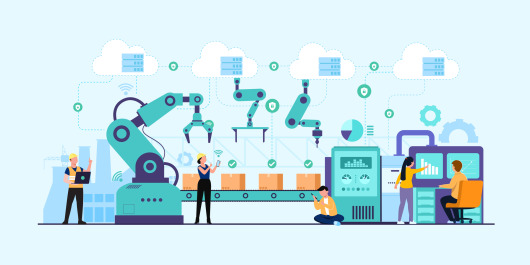
The Changing Role of Engineering in the Manufacturing Sector

Manufacturing is no longer what it used to be. Modern manufacturing facilities present visitors with an entirely different environment from the assembly lines that operated during past generations. Engineers now undertake tasks that extend beyond their conventional work of solving problems while working in concealed settings. They’ve become strategic leaders driving innovation at every level.
The recruitment process affects all participants who join the recruitment activities. HR teams require a diverse range of talent. Recruiters need to recognize the emerging skills that are now required in the job market. And job seekers? People today face an environment that transforms at an unprecedented rate.
From Reactive to Proactive: The New Engineering Mindset
Traditional manufacturing engineering was largely reactive. Engineers solved the problem that caused the system to fail. Production slowed down, and they optimized it. Modern engineers operate with a predictive mindset, which extends their planning to three stages into the future.
The systems they create can currently detect system failures that have not yet occurred. Organizations can identify patterns that human observation would not detect through the implementation of data analytics. Organizations require adaptable systems that enable them to respond quickly to market changes when their business environment undergoes shifts.
Engineers dedicate their time to strategic planning rather than fixing problems, thanks to this forward-thinking approach. The boardroom members focus on creating five-year strategic plans. They work with marketing teams to support product launch initiatives. The team works with customers to identify their specific challenges.
The process of employee selection under a manager’s supervision brings various benefits and drawbacks to the hiring procedure. The engineer who performs only technical work will no longer be sufficient for the job. Your organization requires staff members who possess business leadership thinking skills, in addition to their specialized technical knowledge.
Technology Integration: More Than Just Automation
Manufacturing automation has become a common topic of discussion among all people. The story focuses on the process of integration. Engineers today employ modern technology to develop unified solutions that operate within existing operational systems.
Take artificial intelligence. Placing an AI system in a factory does not guarantee successful outcomes. Engineers must understand the impact of AI decisions on product quality standards, delivery schedules, and personnel safety protocols. The process requires them to teach algorithms, translate results, and explain findings to stakeholders who lack technical expertise.
The same principles apply to IoT sensors, robotics, and advanced materials. The development of every technology requires engineers who connect modern technological principles to real-world solutions.
Organizations have begun taking proactive measures due to the current talent shortage in the market. The organization seeks to hire engineers who have studied a variety of subjects. Computer science mixed with mechanical engineering. Materials science combined with data analytics. Engineers who possess the most value in their field demonstrate expertise in multiple technical languages.
Sustainability: The New Engineering Imperative
Organizations must survive through environmental matters, which have evolved from voluntary choices into essential operational necessities. Engineers need to design manufacturing systems that operate with long-term sustainability, achieving both efficiency and environmental cleanliness.
The regulatory requirements have become the main priority. Businesses have learned that implementing sustainable practices leads to financial benefits. The reduction of waste leads to lower material costs. Energy-efficient processes reduce utility bills. Companies can produce supplementary revenue streams by using circular design principles to recycle materials.
The leaders of these initiatives require abilities that traditional educational programs did not teach. Life cycle assessment. Carbon footprint analysis. Renewable energy integration. Waste stream optimization.
However, what makes this particularly challenging for recruiters is that these skills are still relatively rare. Most engineering programs are only now beginning to emphasize sustainability. Engineers with experience in green manufacturing operations are in high demand in the job market and earn higher compensation rates.
Data-Driven Decision Making
Manufacturing facilities produce enormous amounts of data. Every sensor, together with every machine and quality check process, generates operational improvement data. Engineers are becoming data scientists by necessity.
The team develops dashboards that monitor essential performance indicators using real-time data, employs predictive models to forecast equipment maintenance requirements, and implements product design improvements based on customer feedback analysis. Statistical methods improve all operational aspects, including inventory management and shift scheduling.
Engineers now have access to new communication tools due to the increasing focus on data collection. They’re presenting findings to executives who care more about ROI than technical specifications. The system transforms complicated analytics information into valuable business intelligence.
The most successful manufacturing engineers today can tell stories with data. The videos present both the events and their significance, along with instructions for future action.
Collaboration Across Disciplines
The days of engineers working in isolation are over. Modern manufacturing requires continuous collaboration between engineering staff, operations personnel, quality assurance specialists, supply chain experts, and sales department members.
Engineers organize cross-functional meetings to lead organizational improvement projects that span multiple departments, translating engineering details for non-technical staff to achieve company-wide consensus on vital organizational decisions.
The company employs this collaborative approach to achieve its goals, which extend beyond its organizational boundaries. Engineers need to communicate directly with suppliers to achieve better quality in their components. The company collaborates with customers to identify their specific application needs. The organization adheres to regulatory guidelines through its collaboration with government agencies.
HR professionals must look for engineers who show strong abilities in soft skills. Technical competence continues to be essential, but the development of communication skills, leadership abilities, and emotional intelligence holds equal value.
The Skills Gap Challenge
The numerous changes in the job market have led to a significant shortage of essential skills. Traditional engineering education programs often fail to equip students with the skills needed to succeed in contemporary manufacturing environments. Business organizations require employees who demonstrate rapid learning abilities and a continuous acquisition of knowledge.
The most advanced manufacturing organizations allocate significant funds to train their staff members and support their career advancement. The companies run mentorship programs that pair senior engineers with new graduates and work with universities to create educational programs and ongoing training, which keeps team members proficient in current technology.
But training takes time. Manufacturing is undergoing an accelerating rate of transformation, with no signs of deceleration. The changing job market enables recruiting companies to find suitable candidates who possess both classic and contemporary abilities.
Remote Work and Digital Collaboration
The pandemic accelerated existing manufacturing engineering trends. The manufacturing process continues at factory sites, although engineers can perform their work from any location.
Design reviews happen via video conference. Simulation software operates as part of cloud-based platforms. The system enables remote experts to collaborate with on-site technicians using augmented reality for troubleshooting operations. Project management tools help teams operating in various time zones maintain successful collaboration.
The platform enables users to reach candidates who were inaccessible before. A company in Ohio can now hire the best process engineer in California. International collaboration occurs with such frequency that it no longer stands out as an unusual practice.
Remote work in manufacturing engineering demands unique competencies that differ from those required for standard office-based positions. Engineers require proficiency in digital collaboration tools. They must communicate clearly in writing since casual conversations are less frequent. Employees need to possess practical self-management skills to work independently without requiring constant supervision.
Looking Ahead: What This Means for Hiring
The changing role of engineering in manufacturing operations creates both new difficulties for hiring staff and innovative ways to find qualified candidates. Organizations that change their recruitment methods will become market leaders. Organizations that stick to their conventional recruitment methods will lose their ability to find the talent they need.
Manufacturers who achieve the highest success levels today adopt modern methods to locate their workforce. The hiring process now focuses on evaluating problem-solving skills, adaptability, and cultural compatibility in addition to technical qualifications. The company offers a competitive compensation package that includes professional development programs. The organizations develop employer brands that attract top engineering talent to their workforce.
Your Next Strategic Move
The manufacturing industry operates under an active transformation process. Business organizations require staff members with engineering skills to manage the complex operations of this field. The search for these experts demands knowledge about both technical specifications and current market developments.
Hunter Recruiting specializes in recruiting engineering talent for manufacturing companies, helping them thrive in the current market environment. Our team recognizes the specific challenges that contemporary manufacturing operations face, along with the essential competencies required for success.
Your organization needs help building an engineering team that will drive success in the years to come. Contact Hunter Recruiting to learn about our talent acquisition services that will help you find the right candidates for your manufacturing operations.













